A Pilgrimage Ceremony in Colombia for Reordering and Caring for Life on Earth
Introduction
In Colombia, the Mhuysqa and the four Indigenous people of the Sierra Nevada de Santa Marta (SNSM) have taught generation after generation the importance of water as an essential part of life on a spiritual, identity, and ceremonial level. An example of this is the practice of “Caminar la Tierra” or “Walking the Land,” which reconnects sacred points by making offerings (ATA-TA) in different sacred lagoons and the sea to keep the balance of the world and grow on a spiritual and collective path.
The academic Reinaldo Barbosa points out in his book El Orden del Todo that the ancestral memory of the people is the primary source of documentation. “Their knowledge, forged over thousands of years, gives evidence of the existence of a culture as important as the great civilizations. Their great work has been conserving the jungle, the water, and the planet” (Barbosa, 2011, p.16). Therefore, the duty of the Mhuysqa and the four Indigenous people of the Sierra Nevada de Santa Marta has been established in the Law of Origin under four principles: Everything that surrounds us is alive and constantly changing; everything is interconnected – the part is the whole, and the whole is the part; what we do to any being will affect the whole; and just as we have a spirit, all other living beings also have it.
Discussion
For Indigenous people, life is intertwined with water, which is related not just to their Law of Origin and cosmogony but also to understanding the water cycle. For these communities, according to Barbosa (2011), the water that flows from the snowy peaks to the sea is like the “milk” that suckles and delivers its energy to the world. For that reason, for them, the river and the vein allow communication and exchange between all the actors that inhabit each body, allowing movement, that is, life. Human beings are made up of around 80% water, and it is not illogical that they are correlated with the phases of the moon, rain, fertility, transformation, metamorphosis, and rebirth, which is linked to a spiritual and ecological path. Thus, the mandate of Indigenous peoples is to maintain the conservation of the universe and guarantee the balance and harmony of nature, which is related to the encounter with the internal waters of the human being.

Indigenous people talk about the necessity of walking the territory to understand this internal walk. For them, there are energetic or sacred points that are connected to the origin of life and which require their care and connection by human beings. In an interview held by Enlazando Raices Association (2022), Kwakumaku, a young leader of the Iku community, said that «these sacred points are elements of nature that become cultural symbols for a community. Their union and well-being are linked to the balance of Saku or Mother Earth and all the beings that inhabit it.»
In the same way, for the Mhuysqas, in the «Ceremonia Sagrada del Correr la Tierra,» or the «Sacred Ceremony of Walking the Earth,» the lagoons represent the place of origin and human transformation. In another interview held by Enlazando Raices Association (2022), the architect Roberto Santos, co-author of the book Sacred Walk of the Grandmothers published in 2022, explained that the ceremony was and continues to be a path of spiritual growth that reconnects human beings with sacred points of the territory. «Seven lagoons, all in the hills…. Each has a particular name and defines the function the place fulfills within the territory. At the same time, each one is compared to a person’s growth – from the child to the eldest, from the apprentice to wisdom,» he said. Therefore, ATA – TA means «to walk the Earth » – «a need to weave the external and internal territory with our feet and legs like a philosophy of life, and where knowledge comes and is learned. In the end, a path that recovers us with all the ancestral memory,» concludes Santos.
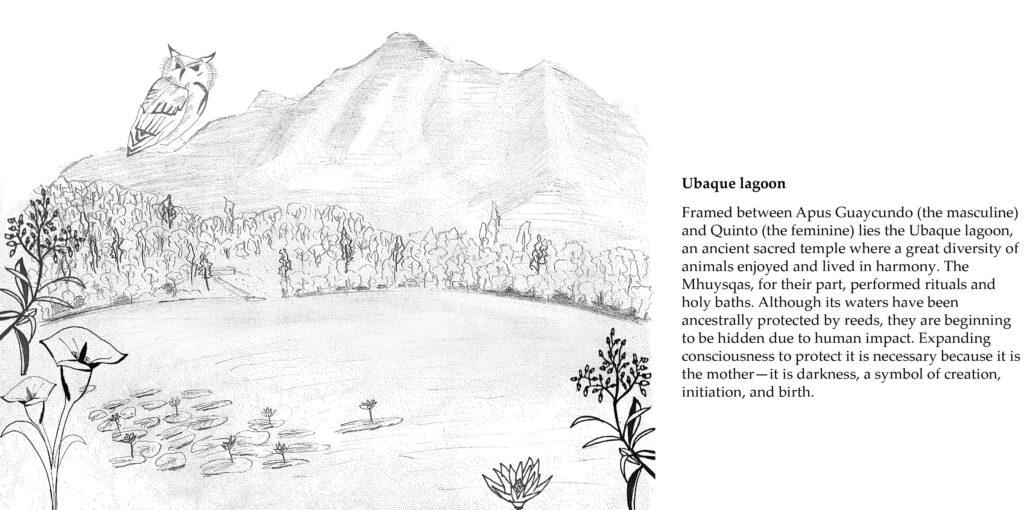
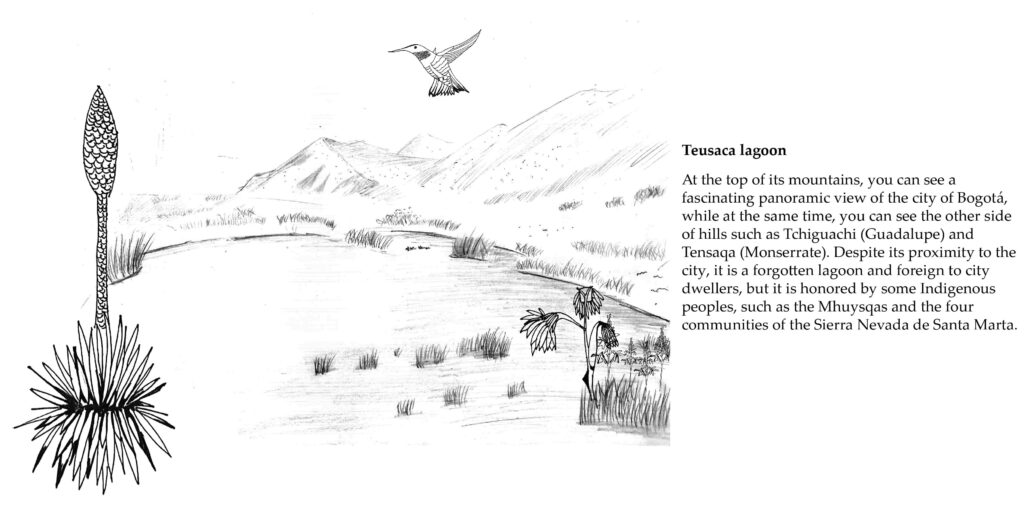
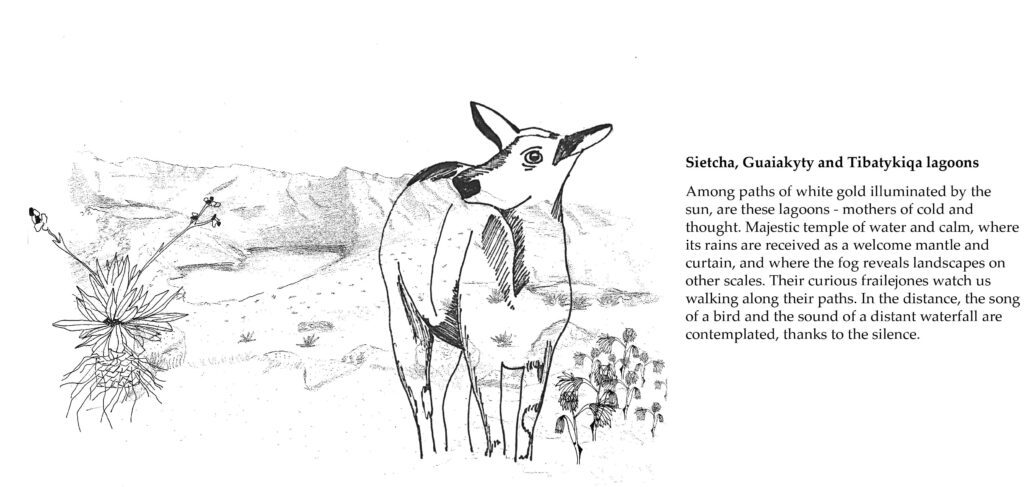
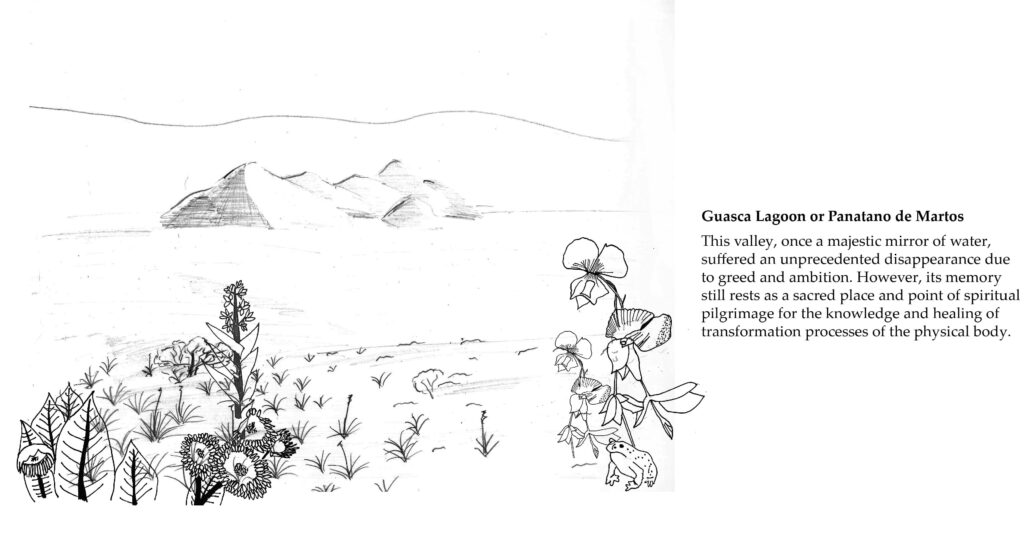
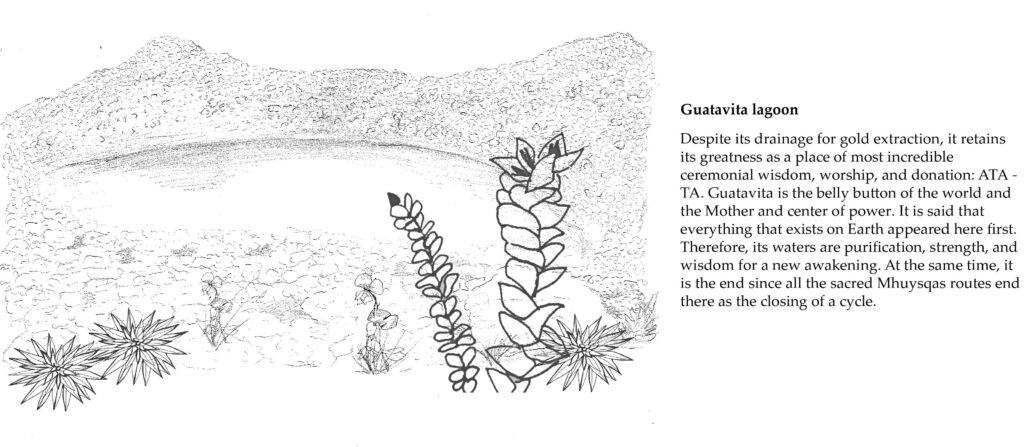
Colombia is a territory of water whose memory rests in the biodiverse landscape of its Andean mountains and the Caribbean Sea, between paramos, snowy mountains, savanna, wetlands, mangroves, swamps, forest, and coast… In the same way, the inhabitants of a specific and sacred territory carry an internal landscape in their memory, which is interrelated with that external landscape. That is human beings’ cultural and natural heritage, which goes beyond borders that separate and divide, but rather, that is constituted from the poetic language of inhabiting a place.
According to the Worldwide Fund for Nature, Colombia is considered a world waterpower with six snow-capped mountains and over 48,000 wetlands inhabited by 87% of the population. So, humans can see how water represents the possibility of life for all beings on Earth and how the balance and health of ecosystems depend on it.
Global warming, wildfires in North and South America, Amazon’s deforestation, river pollution, the disappearance of water systems, and massive livestock expansion, among others… are putting the world in crisis. It is said that the crisis of the spirit has made water and nature sick. Human beings must unlearn to relearn from a wisdom correlating being and nature—opening a door that encourages the spiritual-physical connection with our biodiverse, multispecies, and multiethnic wealth. It is a promulgation of an ecosophical culture that safeguards life.
Conclusion
Understanding how water is linked to the Indigenous wisdom in Colombia allows non-indigenous people to rethink how they live and who they are, recognizing that everything is interconnected and contributing to an environmental, social, and spiritual balance.
This work is part of the research and projects of the Enlazando Raices Association, such as its science fiction podcast: Ecos del Agua, as well as the non-fiction podcast in English Water Territories.